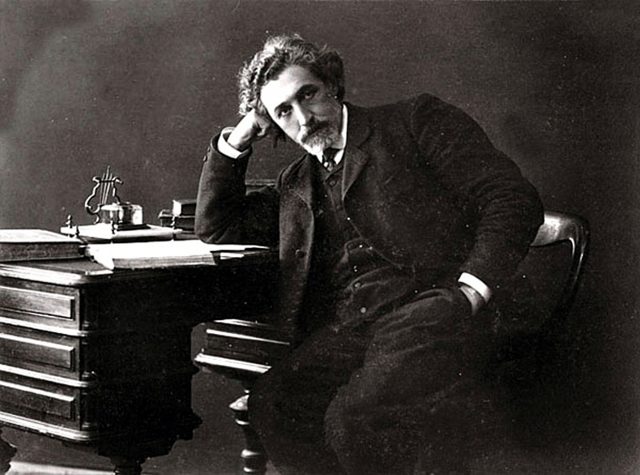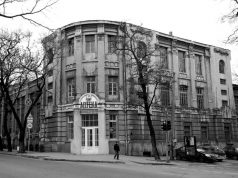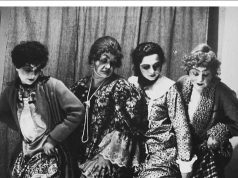An-sky (pseudonym for Shloyme-Zanvl Rappoport), was a legendary Jewish playwright who undertook an ethnographic expedition in Ukraine from 1912-1914 to record the culture of the Jewish world that was rapidly fading even before the 1917 revolution. The author, playwright, researcher of Jewish folklore, polemicist, and cultural and political activist was also a politician who would be elected to the Russian Constituent Assembly as Social-Revolutionary deputy after the 1917 elections. The material that he gathered would serve as the core material and inspiration for An-sky’s seminal play “The Dybbuk, or Between Two Worlds”. An exciting new production related to the play is being prepared by the 24/6: A Jewish Theater Company and will debut in late 2017 in New York City. The director of 24/6: A Jewish Theater Company reflects on the meaning and history of the play in the run up to its premiere.
מפּני מה, מפּני מה
ירדה הנשמה
מאיגרא רמה
?לבירא עמיקתּא
— ירידה צורך עליה היא
Why, oh why
Did the soul descend
From the highest height
To the deepest pit?
— The descent to the abyss,
enables the ascent to new heights.
A haunting voice calls out to me from over a hundred years ago, singing these words a capella on a century old static filled recording. The Hasidic song was collected by An-sky and would be used to bookend his most famous work, as it speaks to the themes of his play. The original wax cylinder recordings today are housed at the Vernadsky National Library of Ukraine, which also released them in digital format as part of a larger Jewish folklore collection. To my good fortune, I found that the YIVO Institute for Jewish Research’s Sound Archive in New York City also holds a copy. In a contemporary twist on YIVO’s transatlantic history, which was founded in Vilna in 1925 to document and study Jewish life and then relocated to New York City in 1940 due to WWII and the Holocaust, the current Director of the YIVO Archives and Library, Dr. Lyudmila Sholokhova, was previously a Research Associate at the Judaica Division of the Vernadsky National Library of Ukraine. She had worked on the digitalization of this collection.
An-sky’s play “The Dybbuk” has been described as “Romeo and Juliet meets The Exorcist” and over the past century has become one of the most celebrated plays in Jewish theater. In the original play, a poor Yeshiva student Chanon wants to marry Leah, the daughter of a rich man, named Sender, at whose table he has spent many a Sabbath meal over the years. He delves into the forbidden, mystical liturgy of the Kabbala in an attempt to prevent her father from marrying her off to another man. Their love is thwarted when her father promises to marry her to another man, Menashe. Hearing the news Chanon dies. While visiting the cemetery on her wedding day to invite her dead mother and grandparents to her wedding, Leah wants to invite the dead Chanon, who has visited her in a dream as well. His soul possesses her at the wedding. Sender does not realize, or is in denial, that the late Chanon was the son of his best friend Nissim, who had died years earlier. When both of their wives were pregnant, they swore that if one had a girl and the other a boy, the children would wed. Sender broke this promise and thus Chanon’s soul has possessed Leah’s body. The rest of the play deals with the struggle to exorcise the Dybbuk.
The play has involved many of the great creative talents of the 20th century. It premiered in Yiddish in 1920, performed by the acclaimed Vilna Troupe a mere month after An-sky’s death. His initial plans to have the play, originally written in Russian, to have its debut performance at the Stanislavski’s Moscow Arts Theatre did not materialize. An-sky himself translated the play into Yiddish, and its performance, directed by Konstantin Stanislavski’s protégé Yevgeny Vakhtangov, launched the Habima troupe, which would ultimately become Israel’s National Theatre. An-sky invited the Ukraine-born Haim Nachman Bialik, considered the national poet of Israel, to translate it into Hebrew. American composer Aaron Copeland was inspired by the music in “The Dybbuk’s” production, which was based on music collected by An-sky’s expedition, when he composed his piano trio “Vitebsk”. “The Dybbuk” inspired choreographer Jerome Robbins and composer Leonard Bernstein, both children of immigrants from the Pale of Settlement, to create a (now canonical) ballet inspired by the play. It premiered at New York City Ballet in 1974 and will be remounted in spring 2018 at Lincoln Center.
In 2014 my theater company 24/6: A Jewish Theater Company spent the summer exploring different versions of the text, researching the storied history of its early productions and the works it later inspired by the who’s who of 20th century art. 24/6 serves as a home for Sabbath observant artists in New York. It is committed to cultivating innovative theater grounded in a rigorous engagement with Jewish tradition, believing that the performing arts play a critical role in the vitality of American Jewish life. 24/6’s Co-Founder Avi Soroka’s parents are both originally from Ukraine. To mark the 100th anniversary of An-sky’s writing the first draft of the play, we presented Bruce Myers’ acclaimed adaptation “A Dybbuk for Two People”, to reintroduce people to this seminal Jewish play. Working with playwright Ken Kaissar and in consultation with 24/6’s ensemble of theater artists, we are composing our own contemporary response to “The Dybbuk”. Our production will incorporate elements of the ethnographic expedition An-sky led to the Pale of Settlement from 1912-1914, collecting folklore, music, photographs and artifacts about the Jews living there. Our piece is inspired by the structure of An-sky’s play, interweaves elements of his own biography, music he collected as well as a contemporary response to the original play. Inspired by An-sky’s own peripatetic life of social justice work and cultural ethnography as well as his goal to document Jewish life, the production is being designed to tour synagogue spaces.
Yoni Oppenheim is a co-founder of 24/6: A Jewish Theater Company.




































